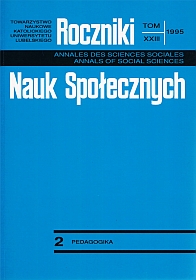Szkoła jako środowisko kształtujące aspiracje edukacyjno-zawodowe i społeczno-polityczne młodzieży
Abstrakt
The analyses seek to compare the chances of private school and state school informing career and socio-political aspirations of youth.
On the ground of the findings the level of aspirations is very high in both groups of secondary school leavers under study, the pupils who represented various types of schools. The difference was revealed in the rate of choices made in relation to the jobs of prestige and high social posts (for the benefit of the private school); it is not however, so big as to make us conclude that the private school is decisively more successful. As to political aspirations there is a marked disproportion between political interests and the plan to engage oneself in political life in the future. Such interests have been declared most of all by the pupils from the private school; on the other hand, lack of any plans to commit oneself to the matter of the country in the future is characteristic to a similar degree of the pupils from both types of secondary schools (private and state alike).
Final conclusions emphasize the obvious positive points of the private school, if they respect the assumed principles as to their curricula, selection of the staff and collaboration with parents (the role of the board of directors of a school is important here). The bearing of the aforementioned positive points, in the case of the private school, was manifested first of all in the high level of pupils' self-assessment; the young people were convinced that they would make their plans come true and complete their education, profession, and would take a social post.
The findings, however, do not decide about decisively poorer chances of the state school. Its efficiency will depend not only on to what extent they will mange to overcome the basic barriers (number of pupils in classrooms, opportunity to select the staff); they will also depend on making the cooperation more efficient, the cooperation on the pedagogical and organizational levels, and on orchestrating the three tendencies of these three "links": board of directors, teachers, and parents.
Bibliografia
Banach C.: Szkoła w opinii teoretyków, uczniów, nauczycieli i rodziców. „Edukacja” 1990 nr 4 s. 75
Deklaracja Programowa STO (mps).
Ekel J., Jaroszyński J., Ostaszewska J.: Mały słownik psychologiczny. Warszawa 1965.
Galas B.: Szkoła a poziom aspiracji młodzieży. „Nowa Szkoła” 1986 nr 11 s.652-655.
Gerszberg A.: Programy autorskie szansą rozwoju szkoły. „Nowa Szkoła” 1991 nr 1 s.13-19.
Janowski A.: Aspiracje młodzieży szkół średnich. Warszawa 1977.
Janowski A.: Oświata polska − zmiany i perspektywy. „Społeczeństwo Otwarte” 1991 nr12 s. 50-56.
Jeziorska J.: Poznanie ucznia − potrzeby i możliwości. „Ład” 1993 nr2 s.1-3.
Kupczyk J.: Uwarunkowania aspiracji młodzieży w starszym wieku szkolnym. Poznań 1978.
Kupisiewicz Cz.: Przebudowa szkolnictwa w krajach uprzemysłowionych. „Kwartalnik Pedagogiczny” 1988 nr 3-4 s. 5.
Kupisiewicz Cz.: Zarys koncepcji przebudowy systemu szkolnego w Polsce. Warszawa 1988.
Kustek H.: Postawy i aspiracje uczniów. „Życie Szkoły” 1987 nr 10 s.558-562.
Lewowicki T.: Aspiracje dzieci i młodzieży. Warszawa 1987.
Lewowicki T.: Idee przemian oświatowych. „Ruch Pedagogiczny” 1987 nr 6 s.16.
Łoś M.: Aspiracje a środowisko. Warszawa 1972.
Mendel M.: Szkoły społeczne. „Życie Szkoły” 1990 nr 7 s. 314-322.
Misiaczek K., ks.: Ku odnowie szkoły. „Głos Nauczycielski” 1991 nr35 s. 8.
Muszyński H.: System wychowania oraz opieki w szkole i poza szkołą. Warszawa−Kraków 1990.
Opolska T.: Wokół aspiracji edukacyjnych. „Pokolenie” 1986 nr 8 s.97-105.
Babczuk W.: Szkolnictwo prywatne. „Głos Nauczycielski” 1991 nr 9 s.5.
Rogala S.: Na progu lepszej edukacji szkolnej. „Kwartalnik Nauczyciela Opolskiego” 1990 nr 1-4 s. 5-8.
Skorny Z.: Aspiracje młodzieży oraz kierujące nimi prawidłowości. Wrocław 1980.
Skorny Z.: Pojęcie aspiracji oraz mechanizmu ich funkcjonowania. Prace psychologiczne. T.13. Wrocław 1980.
Sokołowska A.: Stosunek młodzieży do jej perspektyw życiowych. Warszawa 1967.
Strykowski W., Gawrecki L.: Metody i środki kształcenia stosowane w szkole. Warszawa 1990.
Styliński T.: Szkoła na miarę dziecka. „Przegląd Katolicki” 1988 nr 26 s.4-5.
Szczęsny W.: Szkoła wyboru. „Społeczeństwo Otwarte” 1990 nr 8 s. 47.
Wawrzyniak R.: Podmiotowość − ale jaka? (Uwagi o roli rodziców w szkole). „Nowa Szkoła” 1991 nr 7 s. 443.
Zahorska M.: Jaka jesteś szkoło społeczna? „Społeczeństwo Otwarte” 1991 nr 2 s.41-45.
Copyright (c) 1995 Roczniki Nauk Społecznych

Utwór dostępny jest na licencji Creative Commons Uznanie autorstwa – Użycie niekomercyjne – Bez utworów zależnych 4.0 Międzynarodowe.


